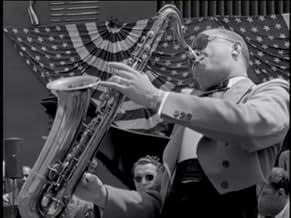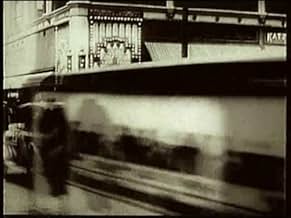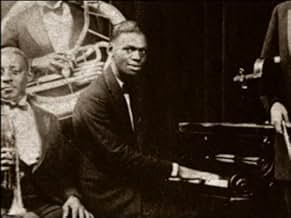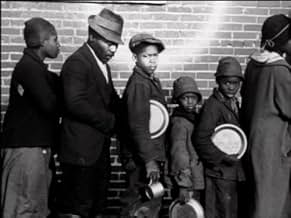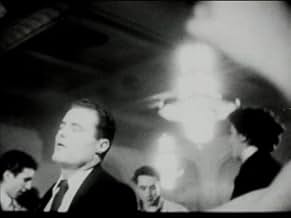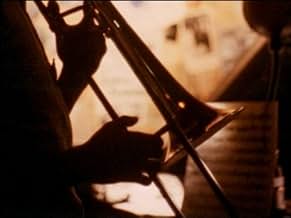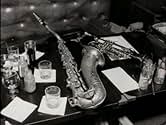Jazz: A Film by Ken Burns
- Mini serie TV
- 2001
- 1h 48min
VALUTAZIONE IMDb
8,6/10
2619
LA TUA VALUTAZIONE
Aggiungi una trama nella tua linguaA survey of the musical form's history and major talents.A survey of the musical form's history and major talents.A survey of the musical form's history and major talents.
- Candidato a 5 Primetime Emmy
- 2 vittorie e 7 candidature totali
Sfoglia gli episodi
Recensioni in evidenza
10PCARONA
I've never been one to send in any type of critique or review to any type of website, but after viewing the Ken Burns "jazz" documentary, I knew this was a call to arms. I've never been so moved before by any film/doc etc.. through the brilliant use of historical footage and expert insight that dances along with the music of the day it's a perfect marriage of sound and vision. I was actually brought to tears of joy several times throughout the series. if anyone is even remotely interested in any type of American history/music of any kind or just a lover of great programming ,this is a must for all. A true American classic! not only did this series reconnect me with such intricate American heritage, but introduced me to a whole new world of exquisite, fascinating music that I immediately fell in love with. For this I am forever grateful to Mr. Burns. the only thing I'm not happy about is the fact that now I've been on a constant quest and spending spree of most of my weekly paycheck on a jazz cd purchasing frenzy!!! Ohh well , it's worth every penny ,keep up the superb work and now its time to venture into the civil war series.
It's very sad to read how many people were bowled over by this so-called documentary. Sadder yet to see how many were coerced into thinking that this was a legitimate history of jazz. Let us look at some facts:
Before beginning this project, Ken Burns had in his own words, "maybe two" jazz cds. Because of this, he looked toward Wynton Marsalis for guidance. As a result, the entire documentary was slanted in accordance with Wynton's beliefs--the strongest belief being that white people have nothing to contribute to the genre.
This in mind, it is obvious that taking all of one's cues from him is a rather large mistake, as evidenced in Ken's show. For example, the entire West Coast movement was written off. There is no mention of Stan Kenton, Woody Herman, and many of the other great artists and innovators, simply because they were the wrong color...white. In addition, the trombone is not considered to be relevant past the big band era (Sorry J.J. Johnson!! Sorry Kai Winding!). Then of course, there is the statement made that no worthwhile jazz was composed after (approximately) 1965...well...until WYNTON MARSALIS came along!! What a slap in the face!! This is just the tip of the iceberg.
Yes, there were some good things in the show. The old footage of the great ones: Armstrong, Ellington, Basie, etc. It's too bad that Burns neglected to interview many of the musicians who are still alive that played in these organizations. Clark Terry, one of the finest trumpet players to ever walk the earth, and who played in BOTH Ellington and Basie's bands, ended up having less than 2 minutes, speaking about things that were relatively trite.
The main message that permeated this series was this: Black people created jazz, and whites made only minor contributions. Wynton has stated before that there is nothing that a white person could teach him about jazz. This means in Wytnon's mind that Django, Kenton, Bill Evans, Bix, Brubeck, Chet Baker, Gerry Mulligan, Jack Teagarden, Kai Winding, etc., etc., etc...have nothing to contribute, because they're white. Sad, isn't it?
Hopefully, someday Wynton and Burns will see that two wrongs don't make a right. Until then, if you want a true history of jazz, pick up a book called "Meet me at Jim and Andy's" by Gene Lees.
Before beginning this project, Ken Burns had in his own words, "maybe two" jazz cds. Because of this, he looked toward Wynton Marsalis for guidance. As a result, the entire documentary was slanted in accordance with Wynton's beliefs--the strongest belief being that white people have nothing to contribute to the genre.
This in mind, it is obvious that taking all of one's cues from him is a rather large mistake, as evidenced in Ken's show. For example, the entire West Coast movement was written off. There is no mention of Stan Kenton, Woody Herman, and many of the other great artists and innovators, simply because they were the wrong color...white. In addition, the trombone is not considered to be relevant past the big band era (Sorry J.J. Johnson!! Sorry Kai Winding!). Then of course, there is the statement made that no worthwhile jazz was composed after (approximately) 1965...well...until WYNTON MARSALIS came along!! What a slap in the face!! This is just the tip of the iceberg.
Yes, there were some good things in the show. The old footage of the great ones: Armstrong, Ellington, Basie, etc. It's too bad that Burns neglected to interview many of the musicians who are still alive that played in these organizations. Clark Terry, one of the finest trumpet players to ever walk the earth, and who played in BOTH Ellington and Basie's bands, ended up having less than 2 minutes, speaking about things that were relatively trite.
The main message that permeated this series was this: Black people created jazz, and whites made only minor contributions. Wynton has stated before that there is nothing that a white person could teach him about jazz. This means in Wytnon's mind that Django, Kenton, Bill Evans, Bix, Brubeck, Chet Baker, Gerry Mulligan, Jack Teagarden, Kai Winding, etc., etc., etc...have nothing to contribute, because they're white. Sad, isn't it?
Hopefully, someday Wynton and Burns will see that two wrongs don't make a right. Until then, if you want a true history of jazz, pick up a book called "Meet me at Jim and Andy's" by Gene Lees.
Don't bother with the U.K. version (12 hours) buy the USA version (19.5 hours) it contains more and can usually be found at lower cost.
Covers the birth of jazz, swing era, move to bebop, free modal very well, but there is only scant coverage of more modern moves in the field of jazz.
Mr Burns has argued that he is more of an historian than a critic and as such he can only really deal with the phases of jazz that are from the past. This line of reasoning is, I think, not un-reasonable.
A nice touch on the DVDs is that when a piece of music is playing then pressing the "info" button on the DVD or its handset, brings up a screen about the music being played, e.g. title of music, who wrote it, who is playing, when was it recorded, etc.
Covers the birth of jazz, swing era, move to bebop, free modal very well, but there is only scant coverage of more modern moves in the field of jazz.
Mr Burns has argued that he is more of an historian than a critic and as such he can only really deal with the phases of jazz that are from the past. This line of reasoning is, I think, not un-reasonable.
A nice touch on the DVDs is that when a piece of music is playing then pressing the "info" button on the DVD or its handset, brings up a screen about the music being played, e.g. title of music, who wrote it, who is playing, when was it recorded, etc.
I am neither a musician nor a serious scholar of jazz, just a fan,but even I could see the flaws in Ken Burns' sometimes fascinating, other times infuriating documentary on the history of "America's music".
Spanning the century, this nineteen hour documentary is most effective at the beginning, when Burns' gift for research is most apparent. You can see the pains he took searching documentation and rare photographs to paint a picture of the roots of the music. However, as the narrative moves on, his over-reliance for third and fourth hand accounts and his own ignorance of the genre becomes apparent.
I am not going to go into the laundry list of "should have" musicians (Lionel Hampton, Stan Getz, JJ Johnson, Charles Mingus gets only ten minutes!) and others that got short shrift or weren't even mentioned. I'd be here all day.
However, I will say that Burns obviously relied too much on critics and writers in putting together his material. Towards the end, especially when they begin to talk of the 50's and 60's, the whole program begins to have the taint of academia all over it.
For example, the 50s phenomenon of the wildly popular California-based "cool jazz" is dismissed by critic Nat Hentoff as "bland" and then never mentioned again.
I am sorry to disagree with the distinguished Mr. Hentoff, but as anyone who has heard the recordings of such greats as Gerry Mulligan and Chet Baker can atest, the music they were producing was just as creative and exciting as their East Coast, black contemporaries.
To people like Mr. Hentoff, the west coast musicians committed the ultimate sin of being white and somewhat popular. Much of the documentary continues along the same "us vs. them" vein.
It seems the people who assisted Mr. Burns took advantage of his ignorance and stamped their orthodox biases on what could have been a great work. Whole genres and types (fusion, Cubano, Brazillian) are either dismissed outright or ignored. It reinforces my view that critics are the most useless species on the face of the planet.
However, I do have to admit that many parts were fascinating. When Burns does interview eyewitnesses to certain events, it shows the flashes of "what might have been". I just wish that he wouldn't have blindly followed the opinions of the the critics and academics and let the audience discover for themselves what to think.
Spanning the century, this nineteen hour documentary is most effective at the beginning, when Burns' gift for research is most apparent. You can see the pains he took searching documentation and rare photographs to paint a picture of the roots of the music. However, as the narrative moves on, his over-reliance for third and fourth hand accounts and his own ignorance of the genre becomes apparent.
I am not going to go into the laundry list of "should have" musicians (Lionel Hampton, Stan Getz, JJ Johnson, Charles Mingus gets only ten minutes!) and others that got short shrift or weren't even mentioned. I'd be here all day.
However, I will say that Burns obviously relied too much on critics and writers in putting together his material. Towards the end, especially when they begin to talk of the 50's and 60's, the whole program begins to have the taint of academia all over it.
For example, the 50s phenomenon of the wildly popular California-based "cool jazz" is dismissed by critic Nat Hentoff as "bland" and then never mentioned again.
I am sorry to disagree with the distinguished Mr. Hentoff, but as anyone who has heard the recordings of such greats as Gerry Mulligan and Chet Baker can atest, the music they were producing was just as creative and exciting as their East Coast, black contemporaries.
To people like Mr. Hentoff, the west coast musicians committed the ultimate sin of being white and somewhat popular. Much of the documentary continues along the same "us vs. them" vein.
It seems the people who assisted Mr. Burns took advantage of his ignorance and stamped their orthodox biases on what could have been a great work. Whole genres and types (fusion, Cubano, Brazillian) are either dismissed outright or ignored. It reinforces my view that critics are the most useless species on the face of the planet.
However, I do have to admit that many parts were fascinating. When Burns does interview eyewitnesses to certain events, it shows the flashes of "what might have been". I just wish that he wouldn't have blindly followed the opinions of the the critics and academics and let the audience discover for themselves what to think.
The culture of the "People, all the People" has been Ken Burns' great theme. In the first two thirds of "Jazz" he eloquently presents these grand ideas. From Armstrong and Ellington to Billie Holiday and Benny Goodman we are swept along in a vibrant, multi-layered story of something special that would change the world.
But once the documentary reaches the 50's, the tale takes a radical turn. There is a lot of focus on drugs and broken lives. This may be important but these sad endings lead the film on a downward emotional spiral. (I understand why Spike Lee detests jazz musician's stories focusing on drugs.) But at least the music is good.
When the so called jazz music of the 60's and beyond is revealed, we see that the climax of this film is a betrayal of its beginning. The "People's music" has vanished. We see that "real" jazz is elitist and narrow and for the most part is a musical dead end.
We find that "real" jazz is played on acoustic instruments such as trumpets and saxophones. So, electric jazz guitarists are almost never mentioned as well as any electric keyboard players. And the only correct modern style comes straight from Be Bop. We hardly hear any Latin jazz or Fusion.
The great music promoter John Hammond once said that his most satisfying discovery was George Benson. Of course we never hear about Benson because he was popular and he plays electric guitar. No, instead the film's ending becomes an overblown promotion of Wynton Marsalis who since he acts as the film's "senior creative consultant" brings the great story down to an example of petty ego.
Overall "Jazz" has seven excellent episodes about a vital part of history and its effect on the world's music. Enjoy these and after that I would gently suggest to quit while you're ahead.
But once the documentary reaches the 50's, the tale takes a radical turn. There is a lot of focus on drugs and broken lives. This may be important but these sad endings lead the film on a downward emotional spiral. (I understand why Spike Lee detests jazz musician's stories focusing on drugs.) But at least the music is good.
When the so called jazz music of the 60's and beyond is revealed, we see that the climax of this film is a betrayal of its beginning. The "People's music" has vanished. We see that "real" jazz is elitist and narrow and for the most part is a musical dead end.
We find that "real" jazz is played on acoustic instruments such as trumpets and saxophones. So, electric jazz guitarists are almost never mentioned as well as any electric keyboard players. And the only correct modern style comes straight from Be Bop. We hardly hear any Latin jazz or Fusion.
The great music promoter John Hammond once said that his most satisfying discovery was George Benson. Of course we never hear about Benson because he was popular and he plays electric guitar. No, instead the film's ending becomes an overblown promotion of Wynton Marsalis who since he acts as the film's "senior creative consultant" brings the great story down to an example of petty ego.
Overall "Jazz" has seven excellent episodes about a vital part of history and its effect on the world's music. Enjoy these and after that I would gently suggest to quit while you're ahead.
Lo sapevi?
- ConnessioniFeatured in WatchMojo: Top 10 Documentary Mini Series (2015)
I più visti
Accedi per valutare e creare un elenco di titoli salvati per ottenere consigli personalizzati
- How many seasons does Jazz have?Powered by Alexa
Dettagli
- Tempo di esecuzione1 ora 48 minuti
- Colore
- Mix di suoni
- Proporzioni
- 1.33 : 1
Contribuisci a questa pagina
Suggerisci una modifica o aggiungi i contenuti mancanti

Divario superiore
By what name was Jazz: A Film by Ken Burns (2001) officially released in Canada in English?
Rispondi

